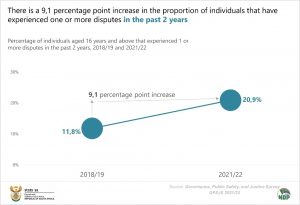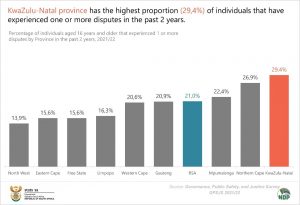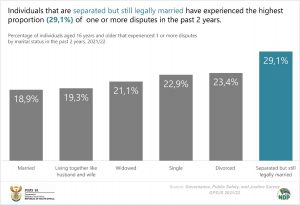Experience of disputes on the rise in SA
According to a new report released by Statistics South Africa (Stats SA), there is a 9,1 percentage point increase in the proportion of individuals that have experienced one or more disputes between 2018/19 and 2021/22 reporting periods.
The types of disputes experienced range from poor service from government and business, conflict with neighbours, corruption, bribes/nepotism to debt, money owed to you or by you, domestic violence, unfair employment practice, and marriage or partnership to name a few. The Governance, Public Safety, and Justice Survey (GPSJS) 2021/22, reveals that an estimated 21% of the population aged 16 years and older experienced one or more disputes/problems during the past two years in the 2021/22 reporting period compared to 11,8% in 2018/19.
Promoting peaceful and inclusive societies is necessary for achieving Sustainable Development Goals (SDGs). In order to achieve peacefulness, government, communities and civil society must work together to ensure that everyone has access to justice; a fundamental right and a means of ensuring opportunities for all.
A pre-requisite for development in any country is peace and justice for all citizens because it creates an enabling environment for a society’s progress. It reflects agreement and harmony amongst the people in the country.
In the past two years (2021/22), 10,1 % of individuals experienced disputes or problems related to poor service from government and business. About 3,9% experienced disputes or problems related to conflict with neighbours, while 2,9% experienced disputes or problems related to corruption, bribes or nepotism. About 2,3% experienced disputes or problems related to domestic violence.
When focusing on the percentage distribution of the top ten most-recent disputes or problems, the report shows that 24,4% of the individuals aged 16 years and older experienced poor services by government, followed by lack of access to water, sanitation, electricity, or housing related disputes (7,5%). The top 10 disputes for men and women are the same, except for the ranking of each type. The exception however is for ‘corruption or bribery or nepotism by government officials’ which is in the top ten of disputes experienced by females and not for males. ‘Unpaid debt by family or relatives’ is in the top ten disputes experienced by males but not in the top ten for females. Both females and males ranked poor service by government as the top dispute recently experienced.
A comparison between 2018/19 and 2021/22, reveals that females experienced similar disputes in both time periods, with a few additional disputes in 2021/22. Disputes related to ‘Disruptions of supply utilities (e.g. water, electricity) still ranked high on the list. Disputes related to ‘Child support or maintenance’, ‘Violence against women’ and ‘Family property ownership’ are some that have remained in the top 10 most-recent disputes experienced by females.
The comparison also indicates that males have experienced some of the disputes that were previously experienced by females in 2018/19, such as ‘Violence against women’ and ‘Child support or maintenance’.
Disputes by province shows that for the 2021/22 period, KwaZulu-Natal has the highest proportion (29,4%) of individuals who experienced at least one dispute, while the North West province had the lowest proportion (13,9%)
Tools and indicators related to assessing aspects of civil justice systems are important. They ensure that policy makers and advocates understand people’s everyday legal problems and experience with the justice system. SDG 16 focusses on the link between access to justice, poverty reduction and inclusive growth within societies.
Individuals who were separated but still legally married have the highest proportion of those who experienced at least one dispute in 2018/19 (27,1%) and 2021/22 (29,1%). Those who are divorced and who experienced at least one dispute increased from 18,7% in 2018/19 to 23,4%
in 2021/22.
When faced with disputes it is important to study how people handle disputes and problems.
Problem-solving behaviour is a key focus of legal needs surveys. How do affected parties begin the journey towards resolving a dispute or problem they are facing? A natural first step would be to try to gather information about the dispute/problem.
The proportion of individuals who sought help from family/friend is almost similar for 2018/19 (28,6%) and 2021/22 (28,9%). There is an 8,1 percentage point difference between 2021/22 (13,4%) and 2018/19 (5,3%) in the proportion of those who sought help from community organisations. The proportions of those who sought help from traditional, mediation, conciliation, arbitration, or religious authorities increased between 2018/19 and 2021/22. More males than females sought help from family/friend (31,2% vs 26,9%), from police (10,0% vs 8,5%) and from courts or tribunal authorities (8,7% vs 7,6%). On the other hand, more females than males sought help from traditional authorities (6,2% vs 4,8%), CCMA (3,6% vs 2,8%) and religious authorities (1,9% vs 1,0%).
The report includes the awareness and perceptions of the Constitution and human rights in South Africa, individual perception of democracy as well as individual experience of discrimination for individuals aged 16 and older. For more information, download the full report here.




